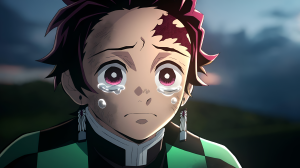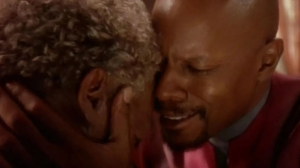Avengers Twilight #1 is another dystopian take on the future of the Marvel universe—with some interesting (and timely) theme—that is unfortunately undermined by some stilted and choppy writing. The new miniseries, written by Chip Zdarsky and illustrated by Daniel Acuña, explores a world where the Avengers have failed, both in their mission as superheroes and as role models for society at large. But while the series initially touches on some interesting themes (disinformation and the often hostile transition from one generation to the next), the comic quickly abandons those for the prospect of a villain and a threat that can only be stopped by the Avengers.
Videos by ComicBook.com
Dystopian futures aren’t exactly uncommon in the superhero genre, and many stories over the years have explored futures where superheroes have failed, usually with disastrous results. Interestingly, Avengers: Twilight‘s version of the future isn’t one where the heroes have not only lost, society has also lost faith in its heroes. The first issue establishes that at some point before the events of the series, the Avengers failed to stop an attack orchestrated by Ultron, leading to the deaths of many heroes (Spider-Man being one). In the aftermath, the Avengers and other heroes were discredited and eventually pushed aside by society.
The first issue follows an aged and depowered Steve Rogers as he navigates this new reality. On the surface, Rogers should at least be content; he has a wife, friends, and some stability, but he clearly holds regrets about the past and has seemingly given up hope that he can make a difference. After confrontations with Jimmy Stark (the son of Tony Stark and Janet Van Dyne) and a group of fascist SHIELD street enforcers, Rogers is brought into an underground resistance and presented with a opportunity to become Captain America once again to overthrow a shadow-y group responsible for the erosion of society.
The strongest part of the issue is Zdarsky’s depiction of Rogers as a toothless old hero frustrated by the constant reminders of his past failures. He’s regularly told that he should be proud of his accomplishments, but Zdarsky does a fantastic job in crafting a character who is clearly discontent with the world but feels hopeless to stop it. I also enjoyed Acuña’s depiction of Rogers, giving him the body of an athlete gone to seed instead of a frail old man.
While I enjoyed the depiction of Rogers, I felt that the comic struggled to really sell the dystopia of Avengers: Twilight, or really make much of a visual impact on readers. Part of this is a deliberate choice—the shadow puppeteers have seemingly used an aggressive mix of fascist laws and media disinformation to keep the American populace at bay while orchestrating their control over the government—but the first issue didn’t visually sell me that this future was supposed to be “bad.” Sure, Luke Cage and Matt Murdock both talk about society’s failings, but I personally would have liked to see more examples instead of learning from it in dialogue. There’s no real visual hook to this series, no singular panel or page that sells me on the comic series, and that was really disappointing.
What disappointed me the most were the few final pages of the series, where Rogers is brought up to speed on the shadowy conglomerate that has seemingly taken control of society. It’s all a bit too… convenient. Rogers is told that SHIELD and a new group of Avengers are committing atrocities both at home and abroad, is handed some Super Soldier Serum, and gets buff over the course of a few pages. The final page, with a grizzly and in-shape Rogers standing in front of a new Captain America costume, feels totally unearned. He’s a hero about to face a threat personified only by the dorky-looking kid of his two friends, trying to assemble a group that has clearly failed in its mission.
Dystopian stories about the future are at their strongest when they either present a cautionary tale about society’s present ills or use the crumbling trappings of the present to show the fundamental truths about its heroes. While Avengers: Twilight tries to do both, it doesn’t do either particularly well, at least in part because of a lack of purpose presented in its pages. I think this comic has promise (and has a creative team that’s certainly capable of telling a good superhero story), but this issue isn’t a strong opening chapter for what’s supposed to be a marquee limited series.
Published by Marvel Comics
On January 16, 2024
Written by Chip Zdarsky
Art by Daniel Acuña
Colors by Daniel Acuña
Letters by Cory Petit
Cover by Alex Ross and Daniel Acuña








